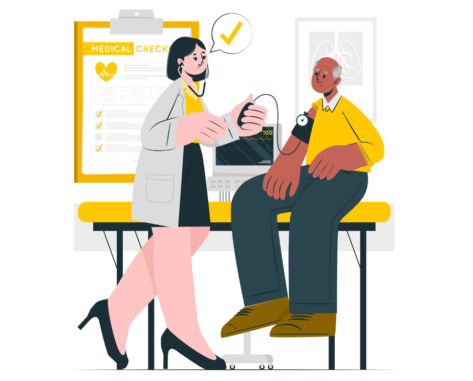LESSON OVERVIEW
The main objectives of this lesson plan are to:
- learn functional vocabulary for going to the doctor’s;
- watch and discuss a medical advice video;
- practise doctor-patient dialogues and describe ailments.
This lesson plan teaches students vocabulary for going to the doctor’s! Students learn the words for common ailments (e.g. sore throat, runny nose) as well as practical phrases (e.g. I’m going to write you a prescription). They work with vocabulary in different ways, like guessing symptoms or finding the wrong word in the sentence. They also watch an advice video about going to the doctor, and engage in role plays and dialogues.
This is a Flipped Classroom lesson plan. In a nutshell, it means that the first part of the lesson needs to be done by students at home. Learn more about flipped classroom and how we implement it in these lesson plans in our post.
PRE-CLASS ACTIVITIES
In the pre-class part of the lesson, students learn and practise vocabulary for going to the doctor’s. They complete sentences by choosing the correct words (e.g. I have a sore/sour throat). Students read sentences which all start with an ellipses (…). In the next exercise, they have to use these sentences to complete different statements with context. After that, students read more statements and replace ‘this’ or ‘these’ with the words and phrases from the first exercise (e.g. This makes you feel hot – fever).
IN-CLASS ACTIVITIES
In the in-class part of the lesson, students begin by looking at a picture of a sick person and some questions. They use vocabulary for going to the doctor’s to guess how this person might answer them (e.g. What symptoms did you have?) Next, students share their feelings about visiting the doctor. They complete the sentence, “When I have to see a doctor, I feel ____________, because…” with an emotion and a reason.
After that, students watch the first part of a video that gives advice for patients visiting the doctor. They need to tick which pieces of advice are mentioned. The next part of the video deals with what bothers patients at the doctor’s. Students read two reasons, think of one more, and watch the next part of the video to check their ideas. Afterwards, they read pieces of advice given to patients when they are offered a medical test, procedure or treatment. They complete the advice statements with what they think might be the right word. Then, they watch the final part of the video and check.
Following that, students discuss general questions about going to the doctor. Then, in pairs, they play a guessing game which elicits the vocabulary for going to the doctor’s. They read a card handed to them and describe their ailment without using the word or phrase on the card. The partner needs to guess what it is. Next, students look at sentences from a patient-doctor interaction. They match sentence halves to create sentences or questions. Then, they decide if each one is said by a patient or by a doctor. After that, students read sentences and cross out the word or phrase in each sentence that doesn’t make sense. They also think of one more phrase to complete the sentence. Lastly, students look at some pictures and write patient-doctor conversations using functional vocabulary for going to the doctor’s.
HOMEWORK/REVISION
This lesson plan also includes an additional task that you can use as homework or revision. In the task, students rewrite sentences said by a patient using words in brackets. Then, they come up with the doctor’s response using other words to help them. The task is available in the teacher’s version of the worksheet. You can print it and hand it out to your students. It’s also included in the e-lesson plan.
Subscribe to unlock these and many other Standalone lesson lesson plans with the Unlimited planWORKSHEETS












Thanks for this lesson, it has helped a few of my A2-B1 level students feel less stressed when they have to communicate in English at the doctors. I was wondering if you had any plans to create a more advanced version of this lesson? I was thinking that a class about more serious health conditions such as; cancers and infectious diseases might be useful.
Hi! Thanks for sharing your feedback with us! We’re happy the lesson is useful for your students!
I can’t promise you anything at this point, but we’ll take your idea into consideration and we’ll see what we can do 🙂